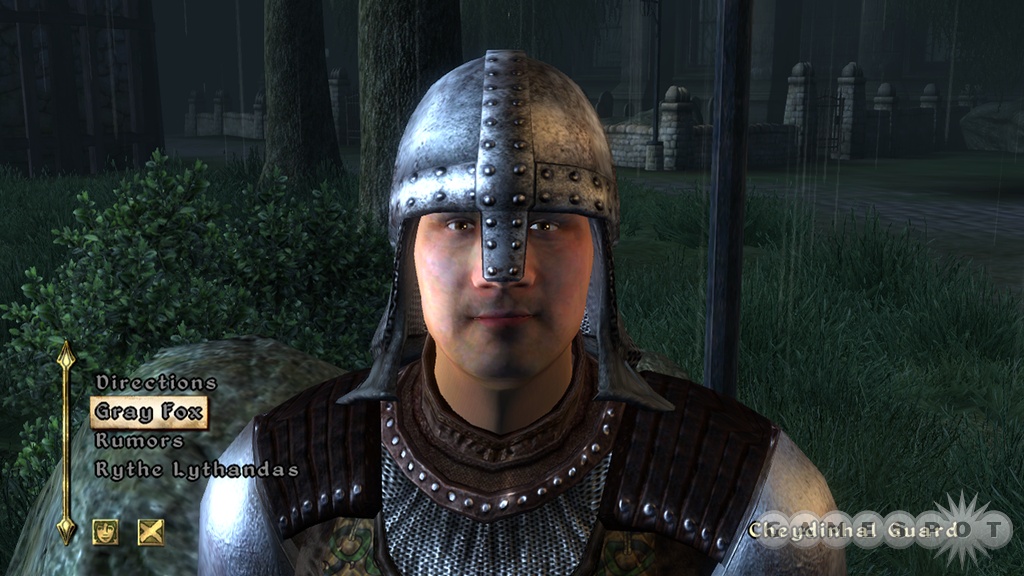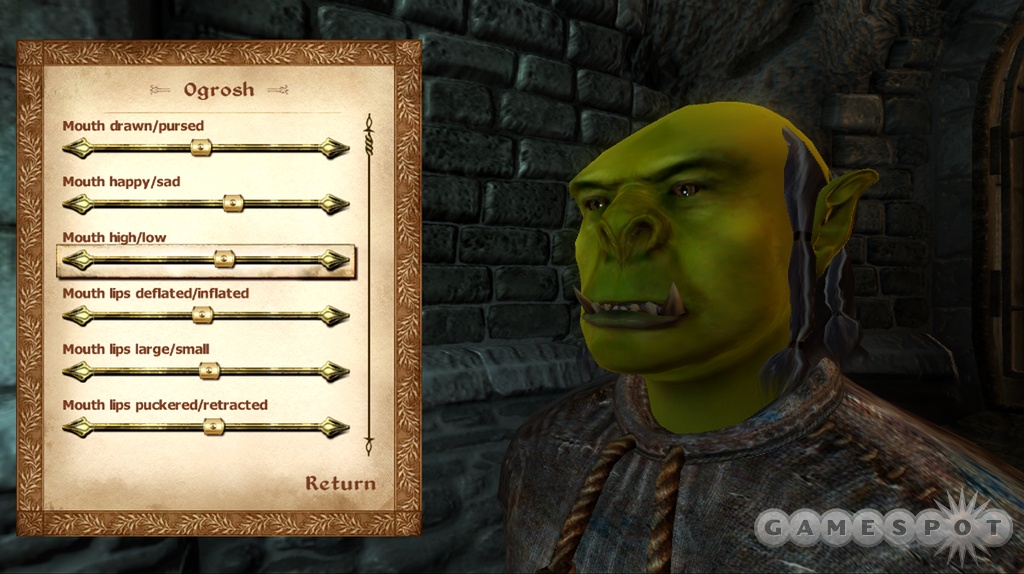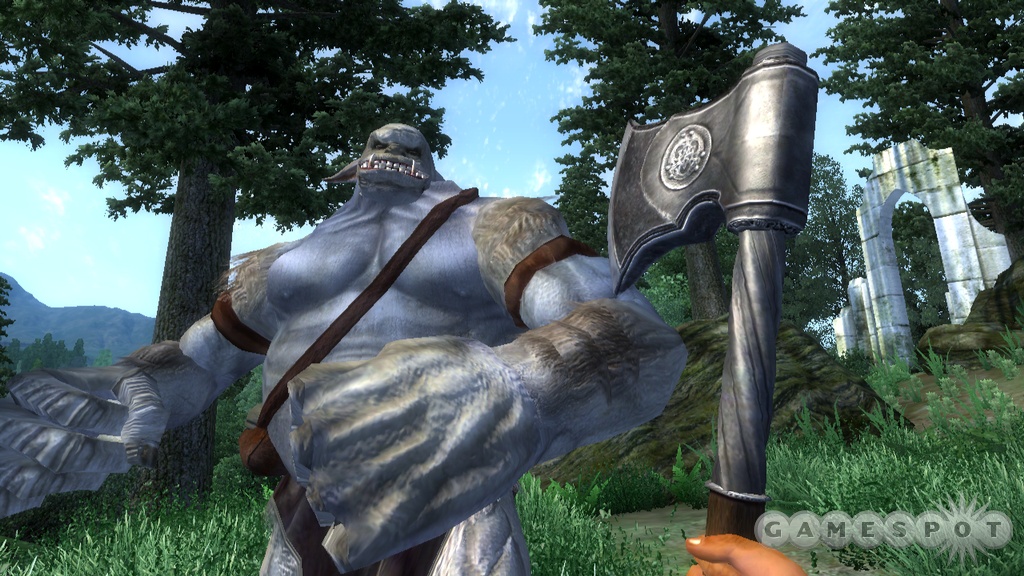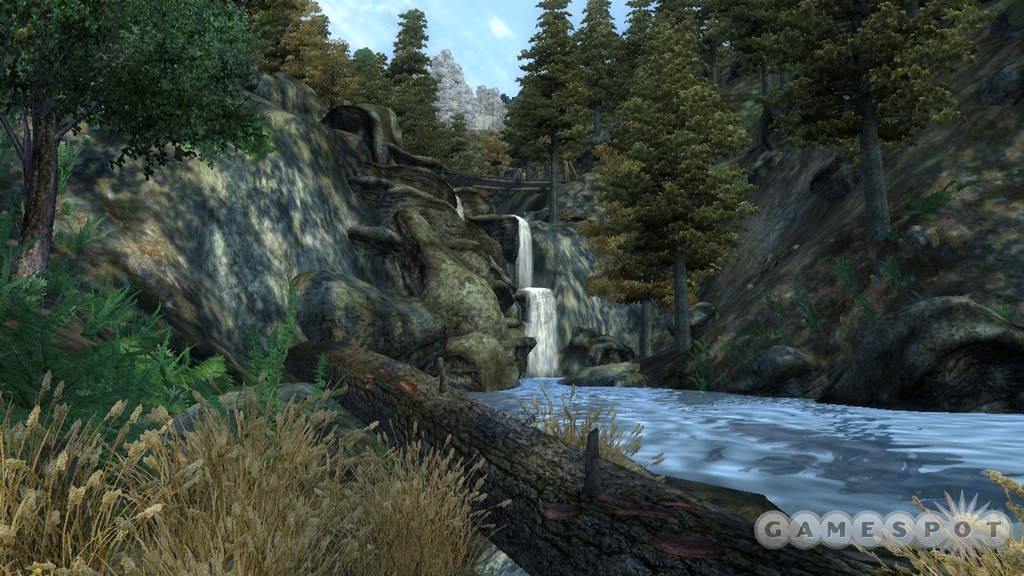The Elder Scrolls IV: Oblivion Hands-On - Quests, Characters, Combat, and Living in Oblivion
We get our hands on both the PC and Xbox 360 versions of this highly anticipated role-playing game and go back to the virtual world of Tamriel.
The Elder Scrolls IV: Oblivion is a big game for both Xbox 360 and PC role-playing fans. That's because Oblivion isn't just the first major role-playing game for Microsoft's next-gen console (fittingly, its predecessor Morrowind was the first major role-playing game for the original Xbox), but it's also the successor to a major PC role-playing franchise that stretches back to 1993. And if there's one theme consistent in all Elder Scrolls games, it's that these are downright huge games that place you in a fully realized fantasy world full of cities, towns, dungeons, castles, and vast stretches of countryside to explore. With Oblivion due out next month, we were recently able to get our hands on both versions of the game for a lengthy play session to check out the opening chapters and to get a solid feel for how this chapter of The Elder Scrolls is shaping up. Please note that this preview may contain spoilers.

We'll first note that both the PC and Xbox 360 versions are pretty much the same in terms of content, so the details discussed here apply to both versions of the game. We'll also add that if you played any of the previous Elder Scrolls games, most notably Morrowind, you'll likely feel right at home in Oblivion. This feels like a much better Morrowind, and we're not just talking about the obvious graphical improvements; it's more streamlined for those who thought that the previous Elder Scroll games were paced a bit too slow. At the same time, there's nothing to keep fans of the "slower" pace from playing that way as well.
In true Elder Scrolls fashion, you start Oblivion rotting in a jail cell. Don't worry--Oblivion plunges you into the action and story faster than any Elder Scrolls game to date. We'll get into some minor spoilers here, though many of the following facts have already been revealed publicly. Once again you'll play as a character burdened by destiny to save the world, this time from a demonic invasion from the hellish plane known as Oblivion. Before you know it, you'll go from the dungeon cell to exploring a dank underground, killing rats and assassins while also getting some welcome introductory exposition from Emperor Uriel Septim VII, voiced by Patrick Stewart himself.
Oblivion is as open-ended as every other game in the series, and throughout the opening mission/tutorial, you'll get a chance to determine your character's appearance, class, and abilities. One nice thing that Oblivion does is separate these processes, so you don't have to worry about making all the important decisions at once. And like with Morrowind, you'll be offered one more chance to go back and edit your character from scratch if you have any second thoughts before you leave the starting area. The first step is to create your character's appearance--you can select a gender and choose your character's race. By all appearances, every single playable race from Morrowind makes its return in Oblivion, from the human imperials and bretons, to different sorts of elves (high, dark, and wood), to lizardlike argonians. Once that's done, you can customize your character's face to an impressive detail, adjusting everything from eye placement and separation, to the fullness of the cheeks.

After you progress through the opening dungeon a bit, you'll then be asked to choose an astrological sign that your character was born under, just like in Morrowind, which grants your character special bonuses (and occasionally penalties). In fact, all the previous game's signs appear to have returned, though not all have the same effects. The Lover, for example, gives you the ability to bestow one paralyzing kiss a day upon an enemy. And after you progress a bit further, you'll finally be able to select a character class, such as knight, agent, healer, and so on, though like in Morrowind, these are really just preset choices of skills, which you can also completely customize from scratch. So, there's nothing to keep you from improving other skills so that you can create a magic-using knight or a thief who wears heavy armor (though that would put you at a disadvantage if you're trying to be sneaky).
Like in earlier Elder Scrolls games, you improve your skills not by leveling up and distributing points like you do in conventional role-playing games, but rather by simply doing things. For example, if you swing your sword a lot in combat, you'll slowly improve your blade skill. Or if you are struck by an enemy while wearing light armor, you'll improve your light armor skill. Or if you run everywhere you go rather than walk, you'll improve your athletic skill. It's a fairly intuitive skill system that rewards you for doing things repetitively.
I Fought the Law
It will take less than an hour to work your way out of the starting level, at which point you'll be deposited outside the imperial city and what's next is up to you. You can proceed directly on the path of the main quest. Or, if you want, you can detour and explore the world a bit. You'll learn about the various guilds and shadowy organizations that you might be able to join, and you'll interact with many different characters. The non-player characters in Oblivion speak to you using full voice chat, and they have a wider variety of things to say. This eliminates the encyclopedic text answers that plagued Morrowind--you felt less like you were talking to a person and more like you were talking to a machine or browsing a Web site. Now NPCs have a bit more personality to them, and you can usually ask them for the latest rumors. However, you can still use the "persuasion" system to coax or bully someone into cooperating with you, and your success there will still be determined by your character's "personality" attribute.

If you make an enemy out of someone, or manage to get on the bad side of the local town watch, look out, because your reputation will precede you. Even little things can make you a bad guy in the law's eyes, from the items that you may pick up from your adventures (the guard may constitute that as theft) to the things that you do. We brazenly picked the lock on a residence in one town, and while we were busy picking the lock on a bedroom, the town watch came up from behind us and ordered us to surrender. You can do so, which means that you'll have to spend some time sitting in a jail cell, or you can try to fight your way out. This won't be easy, though, as the town guard comes at you in force. In our case, we ran through the streets of the town while being chased and shot at. Once outside the walls, we bounded down a steep hill, only to come across a guard on horseback. He dismounted to challenge us, and we ran around him, jumped on his horse, and rode off, only to stumble into a highwayman down the road.
The control and combat systems in Oblivion are pretty straightforward if you've played Morrowind or any other first-person shooter on either the PC or the Xbox. You can outfit your character with a bewildering array of different pieces of equipment, armor, and weapons, most of which you'll recover from fallen opponents. Weapons range from rusty old relics to magical dealers of death (such as the pricey and expensive "battleaxe of hatred," which we highly recommend). Just equip the weapons and armor you want to use and you'll automatically wield them in battle. You can hotkey different weapon types and different magic spells, so you can instantly switch from a sword and shield to a bow in a heartbeat. However, using magic and weapons no longer requires separate interfaces (in Morrowind, you had to either draw your weapon or ready a spell); in Oblivion, you can simply hotkey a magic spell to cast it immediately, regardless of whether you have a weapon drawn.
If you're playing the PC version, the left mouse button attacks while the right mouse button blocks (in the Xbox 360 version, the right trigger attacks while the left trigger blocks). That's right, blocking is now manually controlled, rather than randomly triggered by your character's skill level. So, Oblivion's melee combat seems to resemble that of an action game with first-person combat, like The Chronicles of Riddick or Condemned, in that you'll be able to scoot forward and backward and immediately block incoming attacks. Then again, so can your opponent. Apparently, Oblivion doesn't use an abstracted "to hit" model based on your character's skills, so you won't have the frustrating problem of stabbing your sword right through an enemy's face, yet having that swing register as a "miss." Instead, weapon strikes that look like they hit will always hit; your character's skill points will instead determine to what extent. If you have a low axe skill, you'll do barely any damage with an axe even when you do connect. If you have a high block skill, you'll be able to soak up most of the damage of an incoming blow. If you die, don't worry, because you'll resurrect at the previous autosave point.
Meanwhile, traveling between cities is a lot easier now, since the game has an auto-travel system that can get you from one point to another quickly. Simply call up the world map, click on the city or town, and you'll travel to that point automatically, while the game calculates the amount of time that has passed. Of course, this system won't help you if you need to delve into the countryside on a quest, but it helps to cut down on the tremendous amount of walking you'd otherwise be doing. You can also get a mount (either legally or by other means), so you can ride around in style.
Visually, Oblivion looks good on both the PC and Xbox 360, and this virtual world is an impressive achievement considering that the designers have created 16 square miles for you to explore. Once again, it's the little details that really seem impressive, like the way the stars come out at night or the way deer and other native wildlife scamper about. Both versions of the game ran fairly smoothly, though we did notice that the Xbox 360 version seemed to have a slightly faster pace than the PC version. We were playing nearly final versions of the game and were heartened that both versions had very brief loading times. The game even sounds great, thanks to an abundance of voice acting as well as a motion-picture-quality score from Morrowind composer Jeremy Soule that would feel perfectly in place in any fantasy movie.

So Oblivion looks like it's on track to deliver even more of the role-playing action that the series is known for. That will undoubtedly please series fans, but this is also a game that should appeal to role-playing fans in general. There's a much stronger sense of narrative in Oblivion, and we found ourselves getting caught up in the story quickly. Earlier games, like Morrowind, had you wander around a bit before you found your purpose in the story. There's no such problem in Oblivion, and it looks like this epic role-playing game will deliver a solid story, along with the open-ended depth that the series is known for. The game is scheduled to ship in "spring 2006"--a Bethesda representative states that an official release date will be announced in the next few weeks.
Got a news tip or want to contact us directly? Email news@gamespot.com
Join the conversation